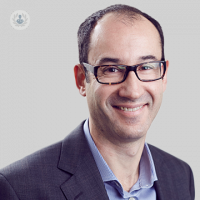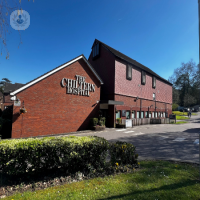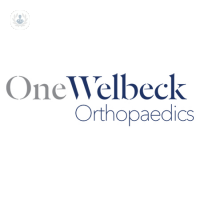What is hip arthroscopy?
Hip arthroscopy is a minimally invasive surgical technique used to diagnose and treat issues in the joint via small skin incisions, less than a centimetre big each. The procedure is done under general anaesthetic and lasts about 90 minutes. The duration will depend upon the type of issue being had and the treatment being carried out.
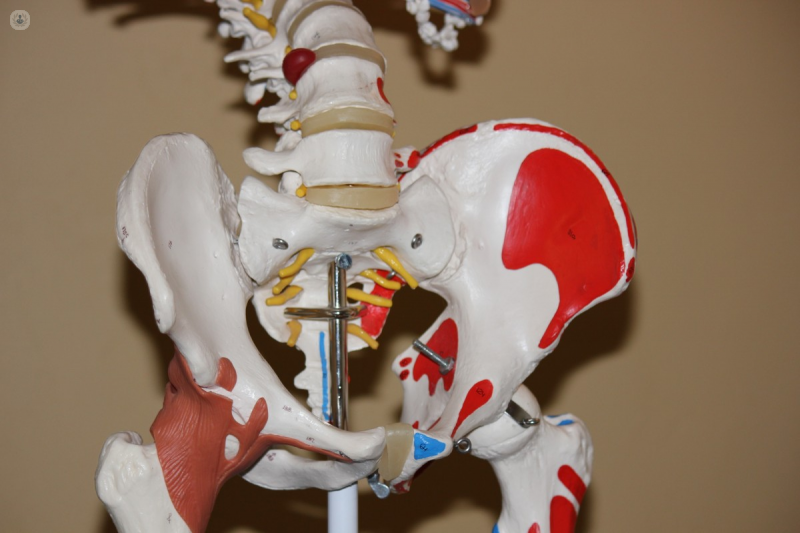
When is it required?
This kind of arthroscopy is used to diagnose:
- Pain issues or hip blockages
- Intra-articular loose body removal
- Labrum tears (femoral head stabilising cartilage)
- Femoroacetabular shock (excessive hip movement friction).
What does it involve?
During the procedure, the leg is gently pulled to make space for the procedure. The surgeon will mark where the incisions should be made, these are known as arthroscopic portals. Two or three incisions smaller than 1 cm are normally made. The arthroscope is inserted through one of the incisions and the surgical tools are inserted in the other.
How to prepare for hip arthroscopy
For two weeks before surgery, the specialist may ask you to take anticoagulant medications. The specialist should know if the patient is consuming alcohol and using tobacco, as smoking is known to delay wound and bone healing.
Post-operative care
After surgery, it is normal for the patient to feel some discomfort, develop some oedema, and a numb pubis for a few hours or longer. After a week to ten days, normal daily activities are allowed, according to discomfort felt, and relative rest.
After around 5-7 days, a check-up will be done and physiotherapy treatment will be recommended. The physiotherapists will create a personalised treatment plan. During the first two weeks, the aims will be to:
- Mobilise the joint to prevent adhesions
- Decrease inflammation and pain
- Avoid muscle atrophy.
It is also important to follow these tips:
- Do not force hips to bend more than 90 degrees
- Use crutches to distribute weight
- Do not force rotation
- Change positions every hour (sit down / stretch)
- Do the exercises recommend by the specialists.
Alternative treatments
This is the most up-to-date treatment available for hip issues. Hip replacement has been the traditional treatment used for hip osteoarthritis, rheumatoid arthritis, or hip fractures.
11-13-2012 08-09-2023Hip arthroscopy
Mr Sebastian Dawson-Bowling - Orthopaedic surgery
Created on: 11-13-2012
Updated on: 08-09-2023
Edited by: Sophie Kennedy
What is hip arthroscopy?
Hip arthroscopy is a minimally invasive surgical technique used to diagnose and treat issues in the joint via small skin incisions, less than a centimetre big each. The procedure is done under general anaesthetic and lasts about 90 minutes. The duration will depend upon the type of issue being had and the treatment being carried out.

When is it required?
This kind of arthroscopy is used to diagnose:
- Pain issues or hip blockages
- Intra-articular loose body removal
- Labrum tears (femoral head stabilising cartilage)
- Femoroacetabular shock (excessive hip movement friction).
What does it involve?
During the procedure, the leg is gently pulled to make space for the procedure. The surgeon will mark where the incisions should be made, these are known as arthroscopic portals. Two or three incisions smaller than 1 cm are normally made. The arthroscope is inserted through one of the incisions and the surgical tools are inserted in the other.
How to prepare for hip arthroscopy
For two weeks before surgery, the specialist may ask you to take anticoagulant medications. The specialist should know if the patient is consuming alcohol and using tobacco, as smoking is known to delay wound and bone healing.
Post-operative care
After surgery, it is normal for the patient to feel some discomfort, develop some oedema, and a numb pubis for a few hours or longer. After a week to ten days, normal daily activities are allowed, according to discomfort felt, and relative rest.
After around 5-7 days, a check-up will be done and physiotherapy treatment will be recommended. The physiotherapists will create a personalised treatment plan. During the first two weeks, the aims will be to:
- Mobilise the joint to prevent adhesions
- Decrease inflammation and pain
- Avoid muscle atrophy.
It is also important to follow these tips:
- Do not force hips to bend more than 90 degrees
- Use crutches to distribute weight
- Do not force rotation
- Change positions every hour (sit down / stretch)
- Do the exercises recommend by the specialists.
Alternative treatments
This is the most up-to-date treatment available for hip issues. Hip replacement has been the traditional treatment used for hip osteoarthritis, rheumatoid arthritis, or hip fractures.


Can robotic-assisted hip and knee replacements be the answer?
By Mr Sujith Konan
2025-01-31
Leading consultant orthopaedic surgeon, Mr Sujith Konan explains how robotic-assisted surgery is revolutionising hip and knee surgery and leading to better surgical outcomes. See more
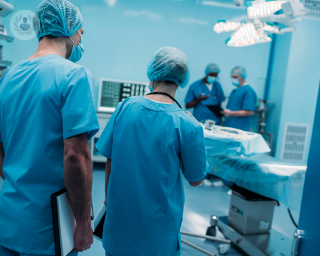

Which hip conditions can you treat using keyhole procedures?
By Mr Sujith Konan
2025-01-31
Keyhole surgery techniques have revolutionised many areas of medicine, from knee and shoulder repair to stomach surgery and gallbladder removal. When it comes to the hip, keyhole surgery – or arthroscopy – has made a whole range of procedures easier and safer. We spoke to leading consultant orthopaedic surgeon Mr Sujith Konan to find out how hip arthroscopy works, what benefits it offers over open surgery and what conditions it can be used for. See more


What you can do to contribute to the success of your hip surgery
By Mr Rishi Chana
2025-01-31
How do I get back to normal function after hip surgery? How can I make a full recovery? These are standard questions most patients make after undergoing any kind of hip surgery and there are many things you need to do to improve the overall success of your operation. Mr Rishi Chana explains to us exactly what they are: See more


How long does it take to recover after a hip arthroscopy?
By Mr Pramod Achan
2025-01-31
When a person undergoes any type of surgery one of the common questions they ask is how long they will take to recover. Even though a hip arthroscopy is a minimally invasive treatment, there is still a recovery period and some important steps to follow to help in your rehabilitation. Mr Pramod Achan explains more. See more
Experts in Hip arthroscopy
-
Mr Pramod Achan
Orthopaedic surgeryExpert in:
- Hip
- Hip prosthesis
- Hip arthroscopy
- Sports surgery
- Hip replacement
- Knee arthroscopy
-
Mr William Bartlett
Orthopaedic surgeryExpert in:
- Sports injuries
- Hip replacement
- Hip pain
- Knee replacement
- Knee arthroscopy
- Hip arthroscopy
-
Mr Sebastian Dawson-Bowling
Orthopaedic surgeryExpert in:
- Hip replacement
- Knee replacement
- Stem cells
- Knee arthroscopy
- Hip arthroscopy
- Joint preservation surgery
-
Mr Seb Sturridge
Orthopaedic surgeryExpert in:
- Hip arthroscopy
- Hip replacement
- Revision hip replacement
- Femoro-acetabular impingement
- Knee arthroscopy
- Knee replacement
-
Professor Richard Field
Orthopaedic surgeryExpert in:
- Hip arthroscopy
- Minimal access surgery (keyhole surgery)
- Hip replacement
- Femoro-acetabular impingement
- Hip resurfacing
- Anterior hip replacement
- See all

The Chiltern Hospital - part of Circle Health Group
The Chiltern Hospital - part of Circle Health Group
London Rd, Great Missenden HP16 0EN
No existe teléfono en el centro.
By using the telephone number provided by TOP DOCTORS, you automatically agree to let us use your phone number for statistical and commercial purposes. For further information, read our Privacy Policy
Top Doctors

OneWelbeck Orthopaedics & Sports Medicine
OneWelbeck Orthopaedics & Sports Medicine
1 Welbeck St, London, W1G 0AR
No existe teléfono en el centro.
By using the telephone number provided by TOP DOCTORS, you automatically agree to let us use your phone number for statistical and commercial purposes. For further information, read our Privacy Policy
Top Doctors

The Parkside Suite Heatherwood
The Parkside Suite Heatherwood
Heatherwood Hospital, High Street, SL5 8AA, Berkshire
No existe teléfono en el centro.
By using the telephone number provided by TOP DOCTORS, you automatically agree to let us use your phone number for statistical and commercial purposes. For further information, read our Privacy Policy
Top Doctors
-
The Chiltern Hospital - part of Circle Health Group
London Rd, Great Missenden HP16 0EN, Great MissendenExpert in:
- Allergies Ophthalmological
- Clinical analysis
- Cancer
- Breast Cancer
- Skin Cancer
- Prostate Cancer
-
OneWelbeck Orthopaedics & Sports Medicine
1 Welbeck St, London, W1G 0AR, W1G Marylebone LondonExpert in:
- Knee arthritis
- Osteoarthritis of the hip
- Hip
- Hand surgery
- Orthopaedic surgery
- Musculoskeletal pain
-
The Parkside Suite Heatherwood
Heatherwood Hospital, High Street, SL5 8AA, Berkshire, AscotExpert in:
- General Surgery
- Orthopaedic surgery
- Plastic surgery, reconstructive and aesthetics
- Obstetrics and Gynaecology
- Ophthalmology
- Urology
- Most viewed diseases, medical tests, and treatments
- Osteoporosis
- Ulnar nerve entrapment
- Peripheral nerve block
- Peripheral neuropathy
- Joint pain
- Lumbar herniated disc
- Spinal surgery
- Minimal access surgery (keyhole surgery)
- Shoulder pain
- Botulinum toxin (Botox™)



